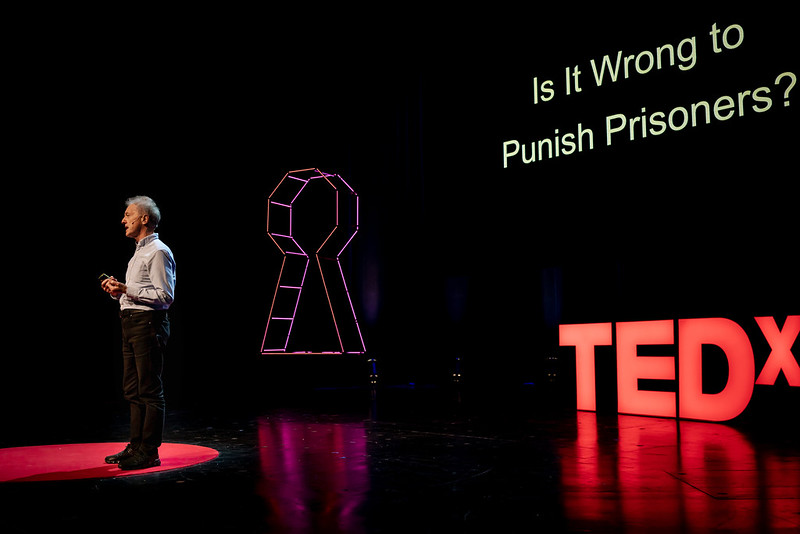Adrian Raine is a British criminal psychologist, currently holding the chair of Richard Perry University Professor of Criminology & Psychiatry in the Department of Criminology of the School of Arts and Sciences and the Department of Psychiatry of the School of Medicine at the University of Pennsylvania.
His research in Neurocriminology has driven him so far as to provide evidence that predisposition of criminal and violent behavior can be traced in the brain. His predictions have been so accurate, that the research team could predict criminal activity 3-4 years after the brain scans of the subject.
As an extraordinary thinker, Raine is very outspoken about the difficult questions these findings unlock: Is criminal behavior equally biological? If violent behavior is indeed ingrained in one’s biology, what are the implications for punishment policies? Should this data be used for preventative purposes, or would that be a horrible thing to do?
Following his talk, I had the chance to interview Raine and find out more about his ongoing research and his proposal to implement treatment programs for criminal offenders, thus eradicating our innate tendency to punishment.
In your talk, you explain how brain scans resolve the issue of blind retribution. So, given your work and research, at what stage in life should people actually get brain scans performed? Should they be early on in life as a form of prevention or after they committed a crime in order to decide upon a form of punishment?
Well, I should say that right now our ability to predict from early on in life to much later on is not good. It’s better than chance, but it’s not 70 % accurate, it’s not 80% accurate, not 90% accurate and I think the question becomes ’What level of accuracy do we need, in making that prediction, for us to act on a child or on the adult?’, because I think one of the problems is that prediction will never be perfect and some people would say that if we have just one mistake, that’s wrong.
The other way we think about this is if I was a parent. Or let me ask you this question! You’re a mom, and you have a 10-year-old boy, he’s called Johnny. And I come to you, and I say: “Little Johnny is rotten, he’s a bad egg. All the boxes are checked. We’ve run tests on him. That’s the bad news. The good news is that we have a new treatment program that’s 70% successful in bringing him back to being normal. If you don’t put him in a treatment program he has a 70% chance of growing up to become a violent criminal offender”. What would you do as the mother?
Well, I would definitely choose to have him undergo the treatment.
You’re a good mom, aren’t you? (laughter) You have a very good sense because to you the 70% odds would work. So, I think it could get like that in our lifetime. But the problem is if we don’t act. And you see, we have a lot of programs in school for kids with learning disabilities (e.g., ADHD) that will help those kids. But why don’t we have programs for kids with impulse control problems or emotion regulation problems?
Therefore, for this type of treatment in schools we need more than just brain scans.
We would. Yeah, exactly. Because it’s not just brains. It’s also genes, it’s environmental toxins, nutrition, it goes on and on and on.
What happens to the convicted subjects whose brain scans, as you mention in your talk, do not show any abnormalities. That means that they would not benefit from a reconsideration of their punishment, would they?
You see, just to step back a second, I think it will show in the brain. Let’s put it this way. If child abuse changes behavior, the only way it can do that, it’s through the brain. All behavior comes from the brain, and studies, not mine, other people’s, show that kids who’ve been either abused or neglected or even if they come from a lower socioeconomic status compared to a control group, they actually show reductions in the amygdala, one of the brain areas that I was talking about.
They also show reductions in the hippocampus, a key brain area for learning and memory and if a kid has poor learning and memory, they aren’t going to do well at school. If they don’t do well at school, it’s going to be hard to get a good job, and if they don’t get a good job, they’ll be more likely to steal money from people to get what they want. But I think it has to come through the brain.
Meaning there has to be a certain abnormality but if we cannot detect it...
But we may not be able to detect it and you’re quite right! But this is today. How about with new innovative brain scanning techniques? New abilities to, at a more microscopic level, detect certain abnormalities that change behavior in the wrong direction? I think in the future, it could be possible to identify this dysfunction in brain circuits and the next question is: ‘What treatment program do we use to put the brain back to normal?’.
Indeed. So, what types of treatment are being used to switch the brain functions back to normal?
Right! Today there are treatments and therapies. Um, one that I’ve been doing a lot of work on, so far publishing five different randomized control trials, is giving omega-3 to children. Omega-3 is a long-chain fatty acid that is critical for brain structure and function. It regulates neurotransmitter functions and gene expression. It makes up 35% of the cell membrane. It’s what we find in fish. Well, three months of supplementation with omega-3 reduces impulsive regressive behavior in children, also in adolescents. And the last study I’ve published was on young offenders in prison. Same thing: It significantly reduced impulsive aggressive behavior in the prison. And the treatment effects remain even after they stop taking omega-3.
Meaning there doesn’t have to be a psychological treatment or…
No, but there are brain stimulation studies we’ve done on a technique called transcranial direct current stimulation. It’s a very simple technique. You put electrodes right here (points to the front of the head), you pass electrical current through it and what you do is upregulate the prefrontal cortex, the part that I talked about today. And what we showed in a randomized control trial, meaning some are randomized to get that intervention, others think they are getting the stimulation, but they are not. We find that the group who gets the stimulation shows a significant reduction in the intention to commit a violent criminal act.
Now that’s just a beginning study that needs replication and extension. But even without that, mindfulness training, we know again from randomized control trials, upregulates, not just the prefrontal cortex. Guess what? It upregulates the amygdala because during mindfulness you’re focusing on your feelings as well, and that’s the amygdala’s job.

Do you think this has the potential of being implemented in the future? Are people open to the idea of actually implementing a treatment instead of retribution and punishment?
I think it’s going to be very difficult to take away from people the concept of retribution and punishment. I even think that we are genetically wired to feel that way. Think about it. Go back to caveman days. If you stole something from me, stole my food from my family. If I don’t do anything about it, you’re just going to steal it from me again and again and I’m not going to have food for my family. Kids will die of starvation; my genes will die off. Instead, if I beat the heck out of you for doing that and teach you a lesson and get my food back, then there is going to be a genetic basis for that response. Because I’m going to survive, my kids will have my genes, and they also will have that fight in them to punish other people.
So, I believe as a species, that’s how we’re wired. My question is, can we overcome our evolutionary genetic makeup in order to change our retributive perspective? Because the retribution approach isn’t going to stop the violence.
Do you think that there will be restrictions applied to those whose brain scans turn out to be positive for criminal behavior, if we take it as a preventative method? Do you think it will be mandatory for them to undergo this treatment?
From an ethical standpoint, I don’t think we can mandate such treatments on people who haven’t committed any crime. We can’t do that. Can we offer the treatment? Can we brain scan you and say you’ve got prefrontal dysfunction? We can ask, do you get impulsive at times? Do you get irritable? Do you fly off the handle? And if you say, yes you do, well, maybe you might benefit from some treatment approaches that can upregulate the prefrontal cortex, regulate your emotion regulation, check your impulsive behavior and that will help you now, not just in the future when you’ve committed a crime.
In your talk, you mention possible factors that determine whether someone’s biological makeup predisposes them to violent behavior and you further address factors related to pregnancies and things that women do that affect their fetus. In that sense, do you think that we should control and regulate a woman’s behavior during pregnancy? And do you think the male plays a role in this?
Oh, the male contributes 50% of the genetic makeup. So clearly the man does. But I think what you’re coming to is the potential for what I said today to be seen as blaming women for the problems we have in society. And I don’t want to do that. The reason I picked on the prenatal and perinatal (birth complication) periods is that they are risk factors for crime that are beyond the individual’s control. And that’s why I wanted to pick on that (before the child is born). So, during the prenatal environment, there are key influences that we know raise the odds of future violence.
But of course, for every one woman who commits murder, we have nine men who commit murder. Men are the problem in society. They are the devils. You, women, are the angels.
So, I just wanted to talk about factors beyond an individual’s control and in many ways, the prenatal period is perfect because there is no way we can blame the fetus. But of course, the solution is not just there, that was just an example, but the men who abuse their spouses, there is a lot on that. Men abuse their children.
They abuse their spouses while they are pregnant.
While they are pregnant? Interestingly, I haven’t seen a study on that. No, I haven’t seen a study on men abusing their spouses while they are pregnant and that results in later offending. I think people haven’t thought about that. I think it could, but I haven’t seen any study on that.
And I think the other part about men who abuse their spouses, I think they do it on a special level. They teach their children that one way to solve problems in life is by beating somebody up. So, men can be a very negative social model for children and stimulate their personal behavior in that way.

You said you’ve worked with psychopaths for a long time. What are the feelings that come to the surface when you are dealing with them? Is it empathy? Is it anger?
What comes to the surface is what lovely people they are to work with and be with. They’re fascinating, they’re intriguing, they’re charming. They are the people I found most enjoyable working within prison because I did work for four years in practice, working as a prison psychologist. They were a lot of fun, they were great. I much prefer working with them than with pedophiles, for example. I mean, having to put yourself to understand how they think about the world and their feelings. That’s much harder. With psychopaths, it’s a lot easier. (Laughter)
And is this what determined you to dive deeper and research the brains of psychopaths in more detail so as to show what an insignificant role they play in shaping their own behavior and thinking?
Well, I just started off researching the biology of antisocial behavior because nobody had really done that forty-four years ago. And I had just begun finding what these factors are and then it gets you thinking, do these factors cause crime? I think the general answer is no, they didn’t. So that got me thinking more on the ethical questions that we discussed and even the implications for the criminal justice system. And so, I didn’t start out with that perspective. I was just doing basic science work and then these other questions came to mind.
Throughout your experience working with psychopaths, is there a certain story or fact that surprised you and would like to share with our readers?
One prisoner wanted to kill me. Um, I was called to that cell to see them while they were waiting, and they had an iron bar. And I was sent to an empty cell where I did the interview with them. And I heard two people running past the door and then a lot of other people running past the door. And what it was is that that prisoner was serving a five-year sentence and for some reason, which I never got to understand, he wanted to spend his whole life in prison. So, he thought the way he would be able to do that is by killing me because I’m the prison psychologist.
But I was late coming to the interview, and he got so frustrated because he was so on edge, waiting for me, that he decided that just instead to go and attack another prisoner. That prisoner, I was told, had permanent brain damage after that. He lived. And it was just a question of minutes. And I heard them running past my cell and all the other people were the prison officers going down after them.
Didn’t you ever feel any sense of fear?
Yes, I did.
Did it ever wake a sense of alarm in you that you should stop working in that field?
Well, what I did in the prison is, in addition to my practical work with therapy and interviewing and assessment, I did some research. I had a mobile laboratory. It was in a truck. And in it, there was psychophysiological equipment (EEG, autonomic nervous system functioning). So, I would put a prisoner in the truck with me. The prison officers from security would lock me into the truck with the prisoner. And one of the prisoners was a hostage-taker. And I knew this before, but when I got in the truck with him, I just began to feel I had made the wrong decision. I shouldn’t be taking as a participant somebody who’s a hostage-taker. But it went okay. But that was scary and certainly driving to the prison every day, I began to get chest pains, for example, because it was just very stressful.
And yet even that follow-up event didn’t stop you from working with them.
Well, I couldn’t get another job. During the four years in prison, I had a PhD. I wanted to be an academic. I applied for 67 jobs and got 67 straight rejections over the four years. And I applied everywhere in the world. I even applied to Papua New Guinea and got rejected. So, it was only on the 68th application that I got lucky, and I got accepted. I got out of prison, otherwise, I’d still be in prison now. I thought I’d never get out and it was very frustrating because I think nobody was interested in the work I was doing.
And now everyone is, and everyone has many questions. (Both laugh)
Some people. Thanks to you. Thank you for all your very interesting questions!
Stay tuned for the video of Raine’s full talk at TEDxVienna UNTOLD, to be posted here soon!
To keep up with Raine’s future work, and to have a closer look at his previous publications, including one of his most famous books, The Anatomy of Violence, visit this website https://psychology.sas.upenn.edu/people/adrian-raine





